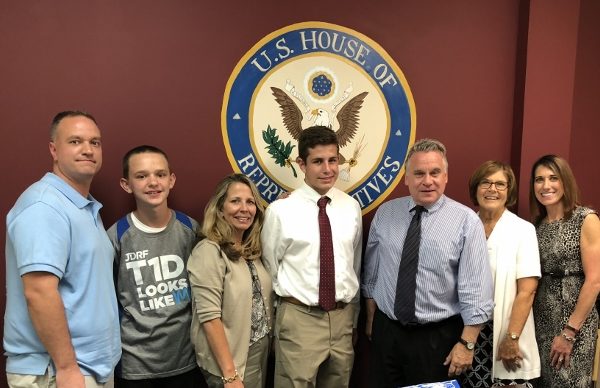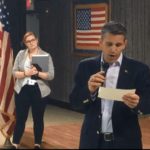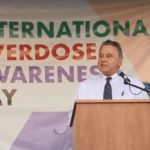Congressman Smith meets with T1D families and advocates

From left to right are Ronnie and Christopher Steppat, Bobbi and Jack Kulpa, Rep. Smith, Ruth Klucharits and Barbara Feinstein
Congressman Chris Smith met this week in Freehold with constituents impacted by Type 1 diabetes (T1D), as well as advocates and leaders of the Juvenile Diabetes Research Foundation (JDRF).
JDRF is the leading global organization funding type 1 diabetes (T1D) research. Their mission is to accelerate life-changing breakthroughs to cure, prevent and treat T1D and its complications.
Type 1 diabetes is an autoimmune disease that strikes both children and adults suddenly. It has nothing to do with diet or lifestyle. There is nothing you can do to prevent it. And, at present, there is no cure.
In T1D, your pancreas stops producing insulin—a hormone the body needs to get energy from food. This means a process your body does naturally and automatically becomes something that now requires your daily attention and manual intervention. If you have T1D, you must constantly monitor your blood-sugar level, inject or infuse insulin through a pump, and carefully balance these insulin doses with your eating and activity throughout the day and night.
However, insulin is not a cure for diabetes. Even with the most vigilant disease management, a significant portion of your day will be spent with either high or low blood-sugar levels. These fluctuations place people with T1D at risk for potentially life-threatening hypoglycemic and hyperglycemic episodes as well as devastating long-term complications such as kidney failure, heart attack, stroke, blindness and amputation.
According to JDRF, approximately 1.25 million Americans have Type 1 diabetes, including 200,000 youth younger than 20 years old and more than one million adults age 20 and older. Between the years 2001 and 2009, there was a 21 percent increase in the prevalence of Type 1 diabetes in youth under age 20.
Each year, 40,000 people are diagnosed with Type 1 diabetes in the U.S., and five million are expected to have T1D by the year 2050, according to JDRF. It currently has no cure and is not caused by lifestyle choices.
“We had an informative and crucial conversation on the challenges of Type 1 diabetes, the need for more funding of research, and also the inspiring stories of those who are living with these challenges with courage, grace, and determination,” Smith said.
Smith successfully advocated for over $2.4 billion in federal funding for T1D research and prevention in the current U.S. budget. He told the group in Freehold that he expects there will and increase in funding in the FY 2019 budget which will be voted on next week.
“I am pleased to see that for FY 2019, the proposed funding of diabetes research at the NIH is an increase on previous funding levels, and I anticipate voting on appropriations legislation next week to meet these funding requests.”
During the meeting in Freehold on Tuesday, Smith signed on to a letter, which is being circulated by the Congressional Diabetes Caucus, urging the Centers for Medicare & Medicaid Services to modernize its policies to cover the next generation of diabetes management technologies.











very few pertinent issues that our Congressman has not addressed: please, district 4, get past the sick, lib character assasination, and the obviously expensive, attack ads, and come out in big numbers, to re- elect Chris Smith.